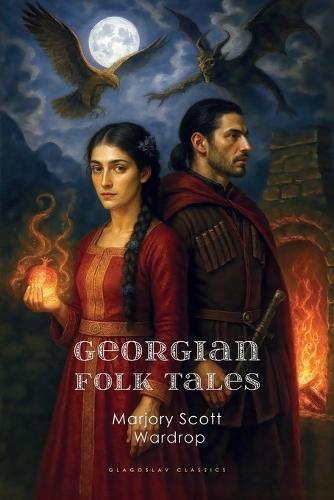Overview
Georgian Folk Tales is a landmark collection of traditional narratives from Georgia, gathered and translated in the late 19th century by Marjory Scott Wardrop. Drawn from diverse regions such as Imereti, Mingrelia, and Guria, the stories range from magical adventures and moral fables to comedic parables and eerie encounters with devs (ogres), witches, and dragons. This beautifully presented 2025 edition revives Wardrop's pioneering work, with a fresh editorial treatment, a modern introduction, and evocative illustrations by Glagoslav Publications. These tales capture a unique cultural landscape where Eastern and Western influences intermingle: Persian demons, Christian saints, shapeshifting animals, and resourceful heroines share the stage. Some stories echo archetypes found across Europe - Cinderella, Bluebeard, and trickster foxes - yet retain a distinctly Georgian flair in their texture, tone, and narrative logic. Wardrop's work is more than translation; it is cultural preservation. She meticulously annotated her sources and preserved the stories' oral style, giving English-speaking readers rare access to the Georgian worldview and humour at a time when the region was largely unknown in the West. Her linguistic skill and anthropological insight shine through every page. For modern readers, Georgian Folk Tales is both an introduction to a rich storytelling tradition and a fascinating artefact of Victorian-era translation. Its themes - cunning over brute strength, fate and transformation, justice and wit - remain timeless, resonating across generations and borders. A must-have for lovers of folklore, comparative mythology, and Caucasian history.
Full Product Details
Author: Marjory Scott Wardrop ,
Marjory Scott Wardrop ,
Jack Monro
Publisher: Glagoslav Publications Ltd
Imprint: Glagoslav Publications Ltd
Dimensions:
Width: 15.20cm
, Height: 1.00cm
, Length: 22.90cm
Weight: 0.277kg
ISBN: 9781804842317
ISBN 10: 1804842311
Pages: 150
Publication Date: 08 June 2025
Audience:
General/trade
,
General
Format: Paperback
Publisher's Status: Active
Availability: Available To Order

We have confirmation that this item is in stock with the supplier. It will be ordered in for you and dispatched immediately.
Reviews
Marjory Wardrop's Georgian Folk Tales is a literary time capsule, rich in folkloric texture and historical significance. Originally published in 1894, this collection was the first substantial English-language translation of Georgia's oral narrative traditions, making it a touchstone for both folklore scholars and lovers of global storytelling. This edition brings new life to Wardrop's work, offering an annotated and lightly modernised presentation that remains true to her voice while making the stories more accessible to contemporary readers. The original preface and introduction - in which Wardrop speaks of collecting the tales ""as a relaxation"" from her other translation work - now read as modest understatements for what was, in fact, a monumental act of cultural diplomacy. The tales themselves are wildly diverse, both in tone and geography. Stories such as ""Master and Pupil"" or ""The Serpent and the Peasant"" explore moral complexity through shape-shifting magic and mythic trickery. Others, like ""The Good-for-Nothing"" and ""The Fool's Good Fortune,"" revel in absurdity and rural satire. The Mingrelian and Gurian sections are especially valuable for their idiomatic realism and aphoristic wit. A notable highlight is ""Conkiajgharuna,"" the Georgian Cinderella, whose magical cow and golden fountain make her tale a fascinating variation on the European archetype. Wardrop's attention to regional storytelling customs - such as the Mingrelian formula ""There was, there was, and nothing there was..."" - lends an authenticity that few translators achieve. What makes Georgian Folk Tales truly stand out is its dual legacy. It offers a window into a vibrant oral culture, shaped by Georgia's position at the crossroads of empires, and it exemplifies a rare female scholarly voice in the male-dominated world of 19th-century Oriental studies. Wardrop's passion and precision have preserved a treasure trove of narrative beauty that speaks as powerfully in 2025 as it did over a century ago.
Author Information
Marjory Scott Wardrop (1869-1909) was a pioneering British scholar and translator who opened a cultural bridge between Georgia and the English-speaking world. Born in London and deeply inspired by her brother Sir Oliver Wardrop's travels, she taught herself Georgian-a language then virtually unknown in Britain-and immersed herself in its literature.Her Georgian Folk Tales (1894), published as the first volume of the prestigious Grimm Library, introduced Western readers to the rich oral traditions of Georgia. But it was her translation of the 12th-century epic The Knight in the Panther's Skin by Shota Rustaveli-published posthumously in 1912-that remains her crowning achievement, praised for both literary grace and linguistic fidelity.Despite limited academic opportunities for women of her time, Marjory combined sharp intellect with deep cultural empathy. She travelled to Georgia, co-founded the Society for the Promotion of the Study of Georgian Language and Literature, and laid the foundation for Georgian studies in Britain. Her legacy endures through the Marjory Wardrop Fund at Oxford and the continuing reverence of her name in Georgia. Marjory Scott Wardrop (1869-1909) was a pioneering British scholar and translator who opened a cultural bridge between Georgia and the English-speaking world. Born in London and deeply inspired by her brother Sir Oliver Wardrop's travels, she taught herself Georgian-a language then virtually unknown in Britain-and immersed herself in its literature.Her Georgian Folk Tales (1894), published as the first volume of the prestigious Grimm Library, introduced Western readers to the rich oral traditions of Georgia. But it was her translation of the 12th-century epic The Knight in the Panther's Skin by Shota Rustaveli-published posthumously in 1912-that remains her crowning achievement, praised for both literary grace and linguistic fidelity.Despite limited academic opportunities for women of her time, Marjory combined sharp intellect with deep cultural empathy. She travelled to Georgia, co-founded the Society for the Promotion of the Study of Georgian Language and Literature, and laid the foundation for Georgian studies in Britain. Her legacy endures through the Marjory Wardrop Fund at Oxford and the continuing reverence of her name in Georgia.




